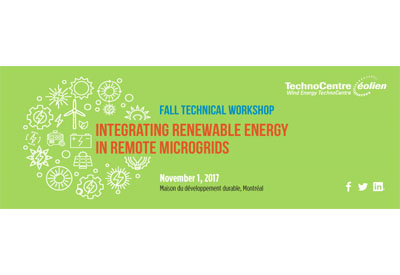Concrete Solutions to Reduce Fossil Fuel Consumption for Electricity Generation

October 19, 2017
In the context of the energy transition currently unfolding where reducing greenhouse gas emissions has become a top priority for society, the TechnoCentre éolien (TCE) will organize a Technical Workshop entitled Integrating Renewable Energy in Remote Microgrids, which will take place on November 1 at Montréal’s Centre for Sustainable Development. During this brand new event, a broad spectrum of experts will discuss the opportunities and challenges of integrating renewables like wind and solar at remote sites such as islands, mines and communities not connected to the public grid.
As a leading figure in research and innovation that serves to support the energy transition, the TechnoCentre éolien has brought together for this Technical Workshop a number of specialists who will discuss concrete solutions that, over time, will help decarbonize energy production while maintaining a secure energy supply, notably in Canada’s Far North.
“Currently, approximately 200,000 Canadians are not connected to integrated grids and receive their power from thermal plants that run on fossil fuels. These plants alone consume 900 million litres of diesel fuel every year and, unless bold actions are taken, diesel consumption in Canada’s remote communities could reach 1.5 billion litres by 2035. It is therefore critical to accelerate the development of solutions that will help boost the deployment of renewable energies at remote sites,” explains Frédéric Côté, TechnoCentre éolien General Manager.
Besides the experts of the TechnoCentre éolien, Workshop participants will have the opportunity to hear speakers from various organizations active in the field such as Natural Resources Canada, the Hydro-Québec Research Institute (IREQ), the Société du Plan Nord, Indigenous and Northern Affairs Canada, Global Affairs Canada, Hatch, TUGLIQ, Sigma Energy Storage and many others. The latter will present a general overview of the energy situation at remote sites and communities in Canada by addressing issues with regard to the technical and economic challenges associated with integrating renewables in these communities, solutions under development, and ongoing research.
The complete program of the event is available at www.eolien.qc.ca/workshop. The TechnoCentre éolien would like to thank the partners of the event, namely the Natural Sciences and Engineering Research Council of Canada (NSERC) and the Canadian Trade Commissioner Service.











![Guide to the Canadian Electrical Code, Part 1[i], 26th Edition– A Road Map: Section 56](https://electricalindustry.ca/wp-content/uploads/2022/11/Guide-CE-Code-2.png)



